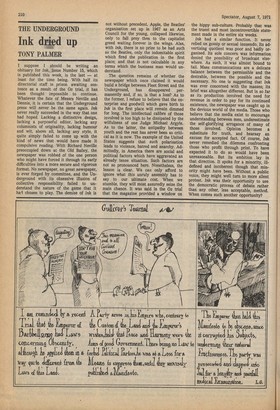THE UNDERGROUND
Ink dried up
TONY PALMER
I suppose I should be writing an obituary for In!. Issue Number 15, which is published this week, is the last — at least for the time being. With half its directorial staff in prison awaiting sentence as a result of the Oz trial, it has been thought impossible to continue. Whatever the fate of Messrs Neville and Dennis, it is certain that the Underground press will never be the same again. Ink never really succeeded in the way that one had hoped. Lacking a distinctive design, lacking a purposeful editor, lacking any columnists of originality, lacking humour and wit, above all, lacking any style, it quite simply failed to come up with the kind of news that would have made it compulsive reading. With Richard Neville preoccupied down at the Old Bailey, the newspaper was robbed of the one person who might have forced it through its early difficulties into a more secure and vigorous format. No newspaper, no great newspaper, is ever forged by committee, and the Underground with its obsessive illusion of collective responsibility failed to understand the nature of the game that it hal chosen to play. The demise of Ink is not without precedent. Apple, the Beatles' organisation set up in 1967 as an Arts Council for the young, collapsed likewise, only to fall prey then to the capitalist greed waiting forever in the wings. Alas, with Ink, there is no prize to be had such as the Beatles, only the indomitable spirit which fired the publication in the first place; and that is not calculable in any terms which the business man would understand.
The question remains of whether the newspaper which once claimed it would build a bridge between Fleet Street and the Underground, has disappeared permanently and, if so, is that a loss? As to the former, I refuse to believe that the enterprise and goodwill which gave birth to Ink in the first place will remain dimmed for long. The intellectual calibre of those involved is too high to be dissipated by the wilfulness of one Judge Michael Argyle. As to the latter, the antipathy between youth and the rest has never been so critical as it is now. The example of the United States suggests that such polarisation leads to violence, hatred and anarchy. Admittedly, in America there are social and political factors which have aggravated an already tense situation. Such factors are not so pronounced here. Nonetheless, the lesson is clear. We can only afford to ignore what this unruly assembly has to say to our ultimate cost. When we stumble, they will most assuredly seize the main chance. It was said in the Oz trial that the magazine provided a window on
the hippy sub-culture. Probably that was the truest and most incontrovertible statement made in the entire six weeks.
Ink had a similar function. It never relied on gossip or sexual innuendo. Its advertising quotient was poor and badly organised. Its sole concern was information denied the possibility of broadcast elsewhere. As such, it was almost bound to fail. Mass communications are a delicate balance between the permissible and the desirable, between the possible and the necessary. No one is suggesting that Ink was ever concerned with the masses; its brief was altogether different. But in so far as its production involved the need for revenue in order to pay for its continued existence, the newspaper was caught up in the devious world of the media. Those who believe that the media exist to encourage understanding between men, underestimate the self-glorifying arrogance of many of those involved. Opinion becomes a substitute for truth, and hearsay an excuse for accepted fact. Of course, Ink never remedied the dilemma confronting those who profit through print. To have expected it to do so would have been unreasonable. But its ambition lay in that direction. It spoke for a minority, illdefined and incoherent though that minority might have been. Without a public voice, they might well turn to more silent protest. Ink was their opportunity to use the democratic process of debate rather than any other, less acceptable, method. When comes such another opportunity?


































 Previous page
Previous page